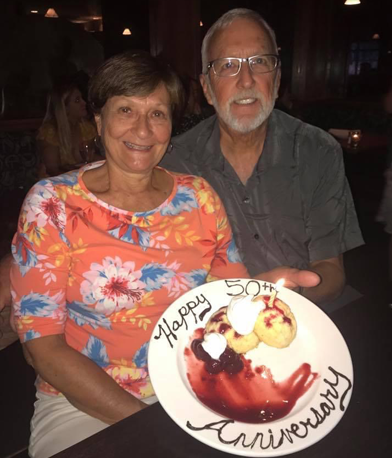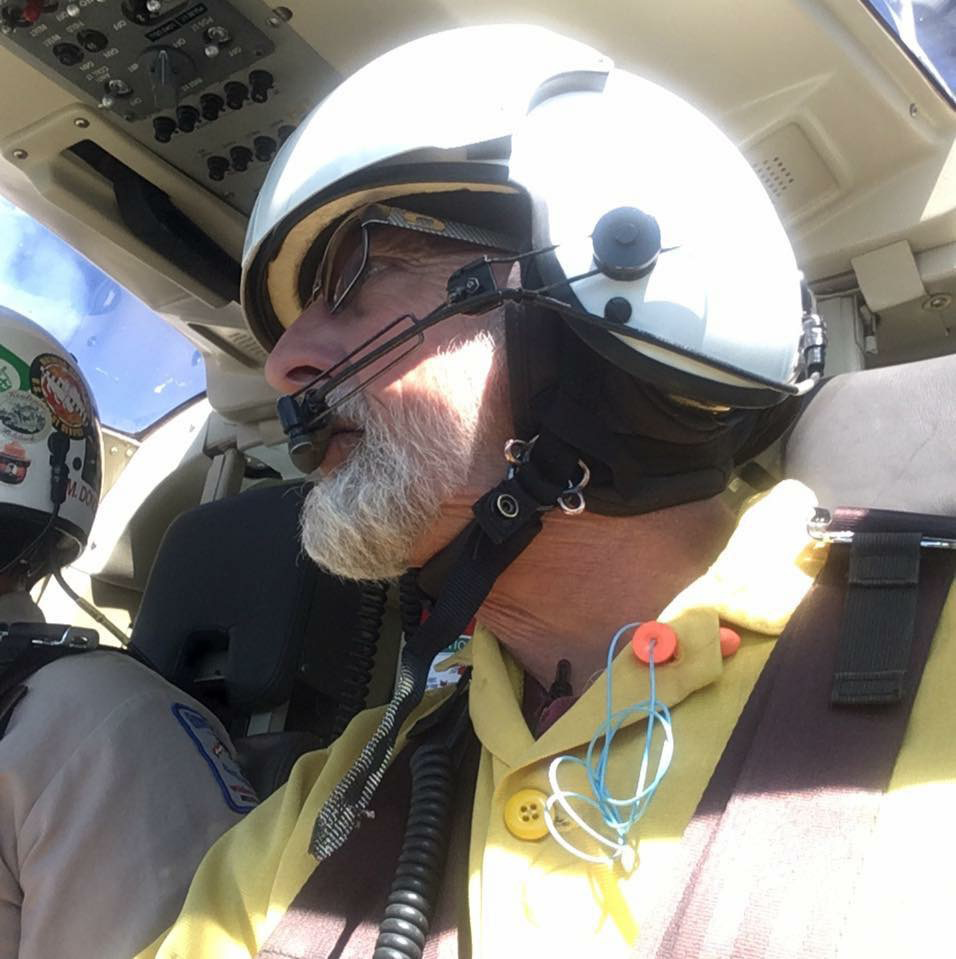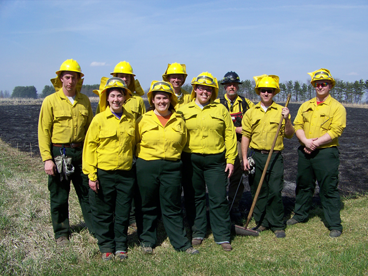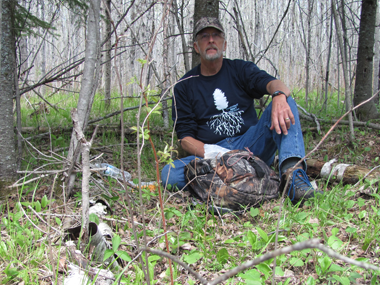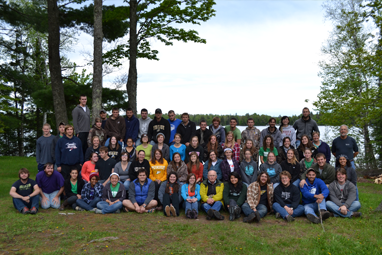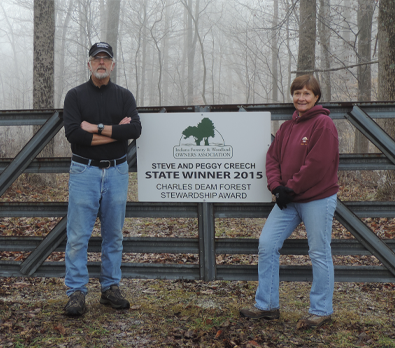FNR Honors Stephen Creech with Lifetime Achievement Award
Stephen Creech grew up in Linton, Indiana, with the entire outdoors as his backyard. Hunting, fishing and trapping came naturally. He was exposed to forestry through 4-H and through his father, Harold, a district conservationist with the Soil Conservation Service and his uncle, Farrell, that was a forester with the USDA Forest Service in Minnesota. His family also exposed him to Purdue University. His father as well as his aunt Nancy and uncle Farrell were all Purdue alumni and other than briefly entertaining Vincennes University, being a Boilermaker was always his planned path.
That path, like many in life, took a detour after his freshman year in West Lafayette. Creech enlisted in the United States Navy in 1967 and spent the next four years serving his country, first as part of a helicopter squadron in Pensacola, Florida, and then aboard the USS Enterprise, a nuclear-powered aircraft carrier assigned to provide mission support across the Republic of Vietnam. He was honorably discharged in August 1971.
“My dad was in World War Two,” Creech explains of his enlistment. “He was a crew chief on a B-24 bomber, so that was there in my mind. Also, it just seemed like the thing to do for me at the time. It provided me time to grow up, and I think I needed that. I didn’t have much to show for it at the end of that freshman year, so the Navy was a good stepping stone for me and a great career path choice.”
While Creech was across the world with the Navy, his wife Peggy was plotting his future with the help of Dr. Bill Bramble, head of the forestry department, and Dr. Eric Stark, Creech’s academic advisor.
Peggy and Dr. Stark laid out Creech’s entire forestry curriculum and Peggy made sure Stephen was enrolled and ready to go when he came back to Purdue in the fall of 1971. But Peggy’s involvement in Creech’s forestry education went far beyond those early enrollment efforts. She finished her own degree at Purdue in January 1972 with a BS in Home Economics (currently the College of Health and Human Services).
“When I took summer camp, my wife came up with our one-year old daughter and she camped on the other side of Lost Lake while I attended school during the day,” Creech recalls. “She spent seven weeks in a tent with no running water and with a one-year old. Charlie Miller, or C.I. Miller, and his wife Ruth took us under their wing during that time. It was that kind of family thing that really made me realize I had made the right choice (in coming to Purdue). Peggy was also the one who would test me on scientific names for dendrology. She can still give you Latin names for several of the trees.”
It was not all forestry all the time for Creech after returning from the Navy. He had a young family to support and took a job selling shoes for Sears and Roebuck down on the levee for three years, working about 30 hours a week.
In the classroom, Creech credits several professors for helping him along his journey to becoming a forester. Dr. Clair Merritt taught silviculture and years later allowed Steve to help him with his fire and oak research. Dr. George Parker taught him the ecology side of fire. Dr. Mason Carter, who came in as the new department head for Forestry and Natural Resources as Creech was graduating, brought a link to the South, where Creech landed his first job as a project forester with the International Paper Company in Hattiesburg, Mississippi.
“International Paper Company is where I probably had my first real introduction to fire, because we burned everything,” Creech said. “Every month we burned something. I thought that was pretty cool as a young forester, to be able to go out and burn things up and accomplish some natural resource management objective. I’ve said this before, I think if I had not had a career in fire, I would have probably spent most of my life in jail as a pyromaniac, because I love fire and I’ve loved it since I was a kid. I’ve always been fascinated by it. Everyone is different. That’s why, even if you go do the same prescribed burn repeatedly over every three years, and burn on the same 40 acres, it’s different. It’s different because weather is different, the fuels have changed, etc. That is why I like it, I guess.”
Creech returned home to Indiana as a District Forester, covering Boone, Hendricks and Marion Counties for the Indiana Department of Natural Resources in 1975.
In 1977, a large fire started in southern California that overwhelmed local resources. Through a national system, resources were called in from across the country to assist. Creech was on one of the two crews sent from Indiana to help that year.
“They put a bullseye over where the fire problem is at and then they start pulling resources from each successive ring as you come back from that bullseye,” Creech explains. “It takes a while to get to Indiana, but we were fortunate enough to be able to go out there and help them. I think it proved a couple of things. One, the DNR and the state of Indiana were very supportive of that, even though it meant taking people away from their normal job for two weeks and letting them go do something to help someone else. And two, it was the pivot point in my career. I was 100 percent hooked on this as a career path from that point on. I thought, this is awesome, this is what I want to do. It kind of put forestry on the back burner for a little bit.”
In 1978, as fate would have it, the Indiana DNR opened a position for a State Fire Management Officer. Creech applied and was hired for the position, which included statewide prescribed fire and fire suppression responsibilities, beginning a 25-year career in the role. That same year, the Indiana DNR did its first controlled burn, or prescribed burn, on Hoosier Prairie Nature Preserve in Griffith, Indiana.
“As the state fire management officer, I was where I wanted to be,” Creech said. “I had no desire to go higher or to go anywhere else. I looked forward to getting up and going to work every day. It never failed. I was home; I was where I wanted to be.”
Settled into his role at the DNR, Creech earned his national certification as a wildland fire behavior specialist in 1983. He has been mobilized nationally as a wildland firefighter since 1987 and has fought wildland fires in 14 states. He earned the state of Florida’s Distinguished Service Award for his assistance with a wildland fire siege in 1998 and earned the Northeast Forest Fire Supervisors Award from the 20-state Northeast Area in 2002. In May 2003, Creech garnered the William Andrews Award as the IDNR’s Employee of the Year. He also earned Council of the Sagamores of the Wabash recognition from the state of Indiana that year.
In 1994, at the request of then department head Dr. Dennis LeMaster, Creech developed a course syllabus for FNR-333, “Fire in the Forest Environment.” He went on to teach that class for nearly 20 years.
“With the help of Dr. George Parker, who was the professor of record, we developed a curriculum and syllabus for the class,” Creech said. “I started teaching in 1994 and taught it through 2015. What’s cool is that one of the students in one of my first classes was Dan McGuckin, and his son was in my last class, so I got through two generations there. It put things in perspective from my teaching career.”
In his career, Creech has taught fire wildland fire suppression, basic wildland fire training and prescribed fire techniques to thousands of students, not just at Purdue or in the state of Indiana, but all over the United States. He even travelled to Madagascar in 2016 at the request of Stony Brook University’s Dr. Patricia Wright to teach wildland fire training at the Centre ValBio in Ranomafana National Park. Creech taught his final Basic Wildland Fire training class at Purdue’s Wright Center in December 2019 after educating approximately 1,000 students over the last four decades.
In addition to teaching through the National Wildfire Coordinating Group, Creech sharpened his own skills in fire education. In 1996, he began serving on a Type 1 National Incident Management Team and gained enough training and expertise that in 2002 he was named as Operations Section Chief Type 2 and Operations Branch Director for a Type 1 Northern Rockies Incident Management Team.
Through his role with the national incident management team, Creech was called in by the New York State Director of Emergency Management to help establish an incident command system to manage the Sept. 11, 2001, tragedy in New York. He worked with the Fire Department of New York (FDNY), New York Police Department (NYPD), Port Authority and Sherriff’s office to develop communication strategies based on those utilized in the wildland fire service.
“Ed Jacoby, who was the director of the State of New York emergency management system had been the state wildlife fire director in New York when I was the fire director here in Indiana, and we were good friends, so when 9/11 happened, he called me,” Creech explained. “I had been a part of a large organization since 1977 and we knew how to manage large and very complex incidents, but the other side of the emergency response groups had never done that. They had always been independent agencies - separate entities - and they didn’t communicate with each other. My task when I went there was to get them to adopt this incident command system that we had been using for decades. It was a difficult couple of weeks while we were getting things hammered out, but they eventually got there. It was a long-term project that lasted years, not months or days like wildfires. This one wasn’t going to be over very quickly and it was hard. It was probably the most difficult assignment I have ever been on.”
Creech also has set up incident command systems on risk incidents from floods and hurricanes to a space shuttle recovery in Texas. He recently was requested to help manage a COVID clinic in Syracuse, New York, but did not take the assignment.
Creech’s organizational skills were called on in a very different setting in 2004. After retiring from the Indiana DNR in 2003, Creech received another phone call from FNR department head Dr. Dennis LeMaster. This time, the proposal was not to create a class but to serve as the Director of FNR’s Summer Practicum program in Iron River, Michigan.
“I was on a fire assignment in Montana when Dr. LeMaster called me,” Creech recalled. “Summer practicum had such a huge influence on me, as it does on a lot of FNR students. At first, I thought he was joking. I had to pinch myself to see if it was real, but taking over that role was huge for me. It let me give back to the Purdue community that had given me so much, so it was definitely one of the highlights of my career.”
In the role as practicum director from 2004 to 2015, Creech encouraged students to try things outside their chosen field. He provided opportunities to try fishing, the shooting sports and to consider the impacts of wildland and prescribed fire as it pertains to natural resource management. He also helped lead camping and hiking expeditions to Porcupine Mountains State Park and other locales in the Upper Peninsula of Michigan. He continues to volunteer at Purdue Forestry Summer Practicum and has developed a process and application for scholarships for students attending the camp.
The legacy that Creech has left behind is not lost on him. He takes great pride in the fact that some of his students have gone on to become experts in their own rights.
“(Purdue Extension wildlife specialist) Jarred Brooke was a student in FNR 333 and now Jarred is the resident expert on fire at Purdue,” Creech said. “That’s a good feeling from my perspective. There are a lot of students that have come through either FNR 333 or summer practicum or taken the fire training that are now in positions where fire is part of what they do and that’s kind of cool for me to see that happen.”
Creech can also see the results of his handiwork through the Big Rivers Fire Compact, a group comprised of representatives from state fire organizations in Indiana, Missouri, Illinois, and Iowa as well as the U.S. Forest Service. He was not only instrumental in the group’s formation but also has acted as its grants administrator since 2003. Creech also is a member of the Indiana Society of American Foresters, the Indiana Rx Fire Council, and the Indiana Forestry and Woodland Owner’s Association.
The latter group honored Creech and his wife Peggy with the Charles Deam Forest Stewardship Award in 2015 for exceptional management of their own forest resources. They own and manage 100 acres in Putnam, Greene and Monroe counties. That same year, the Creeches also earned the Woodland Conservationist of the Year Award from the Putnam County Soil and Water Conservation District for the care of their 30 acres of forestland in that area.
Today, Creech can be found doing consulting work on prescribed fire, fire suppression and forest management plans through his business, Wildfire Management and Training Specialists. He also teaches intermediate and advanced fire classes nationally. Outside of work, he is an elder and chair of the property committee at First Presbyterian Church in Bloomington and has served as a crew leader for Habitat for Humanity of Monroe County since 2011.
Creech has served his local, state and national community well in his illustrious career as a forester, wildland firefighter and wildland fire instructor. He has spent the last 46 years dedicating his life to serving, protecting and educating, leading to his selection as one of Purdue Forestry and Natural Resources 2021 Lifetime Achievement Award winners.
“Stephen, or simply “Creech” as almost all refer to him, is a curious and exuberant student attracting others around him to join in his journey of discovering,” former colleague Jack Seifert said in nominating Creech for the award. “Whether examining a complex process like predicting wildfire behavior to evaluating the health of a timber stand or simply taking a moment to admire the flora and fauna in their environment, there is always something to be learned. Creech asks the questions aloud that he does have answers to, engaging those around to contribute but to also learn with him, empowering them to engage not only their training and education, but to capitalize on their experience. Many say that Creech is the epitome of a servant leader in that his goal is and always has been to strive for excellence, motivating those around him to surpass his ability. To that end, Creech has upheld the Purdue College of Agriculture’s and Forestry and Natural Resources’ goal to ‘educate the next generation in the science, management and sustainable use of natural resources around the globe’ in the most noteworthy manner.”
Creech was shocked when Seifert notified him of the Lifetime Achievement honor.
“That was the only time in my entire life that I was speechless,” Creech shared. “I was absolutely blown away. Since graduating from Purdue, I cannot remember a day that I did not look forward to going to work. My life to this point has been awesome and I am looking forward to what lies ahead. My career successes and the recognition that came with them were not the effort of a single individual, but rather a collective effort on behalf of those that I have worked with. I am honored and humbled, but extremely grateful.
“None of this would have been possible if it weren’t for three very strong, independent and resilient women, my wife of 53 years, Peggy, and my daughters, Wendi and Christin. Even when I was gone for weeks, or in some cases months, at a time fighting fire, they have always persevered and honored the love and compassion I have for firefighting and using fire as a natural resource management tool. First and foremost, they are the ones that have allowed me to have the career that I’ve had. There is a whole group that deserves part of this award and that includes Purdue, the DNR, the fires management teams and the list could go on. They all have a finger in this pie.”
Creech will receive his Lifetime Achievement Award will be honored with the Lifetime Achievement Award in a virtual ceremony on April 20 alongside Outstanding Young Alumni Award winner Dr. Obed Hernández-Gómez, Distinguished Alumnus honorees Dr. Robin Russell and Dr. Todd Atwood, and fellow Lifetime Achievement Award winner Rolf Peterson.

